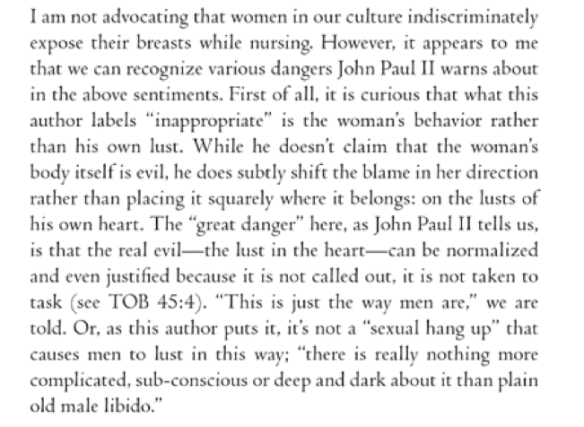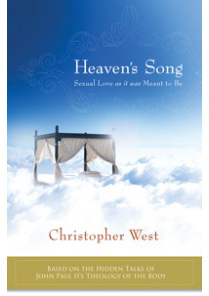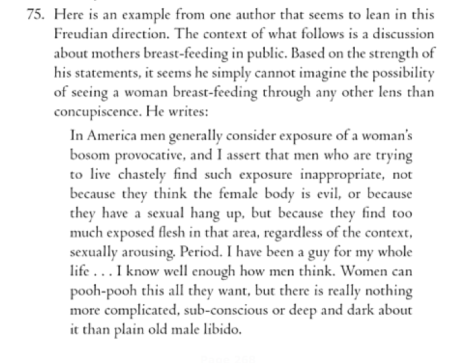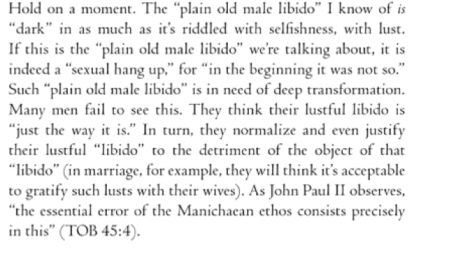 Christopher West has quoted me in his new book, At the Heart of the Gospel: Reclaiming the Body for the New Evangelization.
Christopher West has quoted me in his new book, At the Heart of the Gospel: Reclaiming the Body for the New Evangelization.
Here is West’s own description of the book which he relates to the debate that has rippled across the internet and to which this blog has contributed:
In the midst of these conversations, my work as a popularizer of John Paul II’s teaching has been the subject of some rather harsh critiques. During an extended sabbatical in 2010, I reflected prayerfully on the various challenges my work has received, seeking to glean as much as possible from what various authors were saying. This book is the fruit of those reflections (2).
Kevin O’Brien of the Theater of the Word Incorporated has posted on the subject of West’s critique of my statements. The source of those statements was a guest post I wrote for Dawn Eden. West does not cite his source, so his readers have no ability to assess my statements in their context or to familiarize themselves with my overall line of thought.
I have commented on Kevin O’Brien’s post, so you will find there the substance of my response. Below the images of West’s book in this post I will summarize.

I will summarize first by stating what I think West and both agree on:
- The body and sex are good and holy as God intended them from the beginning.
- Modesty is not simply a matter of hiding the body of the desirable, but also of the interior transformation of the one who desires.
- Sexual desire and pleasure in and of themselves are very good.
- Concupiscence in respect to sexual desire and pleasure is never entirely absent.
- An exalted view of the body and sexuality is helpful to developing a life of chastity.
- Repression, prudery and body hatred are counterproductive to living a life of chastity.
- Lustful desires are always sinful.
Before I state the points on which we disagree I need to make a clarification about what I understand to be West’s position. When he discusses issues of modesty there are two things happening. Even if he is only at that moment suggesting a course of action appropriate to a man’s dealing with incidental exposure to a woman’s values, beyond this West believes that sexual values in and of themselves are the appropriate objects of spiritual fascination. It is not simply a matter of dealing with potential temptations in the most appropriate and spiritually developed way. It is a matter of subduing concupiscence and concentrating on sexual values for their theological significance. This has tremendous import to West’s position.
 After all West speaks about the language of the body precisely in terms of sexual values. Those values, sexual desire, sexual pleasure and the conjugal act itself point beyond themselves to desire for unity with God, the bliss of heaven and the mutual self-giving of God and the soul. So when West suggests that we should have a holy fascination with the body and sex, as he does, for example in Heaven’s Song (notice the bed floating on the clouds), there is no question that West is advocating a holy rejoicing in the sexual values of the body, sexual desire and pleasure, and the conjugal act itself precisely in the incidence of a man’s exposure to a woman’s nakedness (not one’s spouse).
After all West speaks about the language of the body precisely in terms of sexual values. Those values, sexual desire, sexual pleasure and the conjugal act itself point beyond themselves to desire for unity with God, the bliss of heaven and the mutual self-giving of God and the soul. So when West suggests that we should have a holy fascination with the body and sex, as he does, for example in Heaven’s Song (notice the bed floating on the clouds), there is no question that West is advocating a holy rejoicing in the sexual values of the body, sexual desire and pleasure, and the conjugal act itself precisely in the incidence of a man’s exposure to a woman’s nakedness (not one’s spouse).
So here is where I disagree with West; I will express it in terms of my own position:
- The Theology of the Body offers no magic bullet. Consider that the sexual values of the body, sexual desire and pleasure and the very conjugal act are in fact good and holy. In view of this it is impossible to deny that a true and religious appreciation for such values, particularly in the presence of visual stimuli, is supposed to arouse sexual desire and pleasure. But the tendency to indulge such things in reference to a woman who is not one’s spouse is a function of concupiscence and is disordered. Specialized knowledge, namely, TOB, changes none of this.
- A holy appreciation for the sexual values of the body, sexual desire and pleasure and the conjugal act itself excited in conjunction with stimuli, provided by a woman not one’s wife, goes well beyond the theological, philosophical, and artistic expressions of John Paul II. This is the doctrine of West, not Blessed John Paul II.
- West & Co. are living in a dream world if they want to tell us on the one hand that our pure and holy fascination is precisely with sexual values insofar as they are the object of sexual desire and pleasure, and yet as we rejoice in such desire and pleasure we experience none ourselves. What exactly is a holy fascination with sexual values of real persons who are not one’s spouse, precisely because those values excite desire and pleasure, and which do not function under the influence of concupiscence and tend toward lust? This is not true mysticism. It is mystagogery—old fashioned, pagan sex mysticism.
- Stating plainly that there is an objective component to modesty is consistent with both Catholic doctrine and common sense. The sensory exposure to sexual values has an objective and per se normal and in se wholesome effect of the arousal of sexual desire and pleasure, and therefore, in reference to the body of someone not one’s spouse, is inappropriate insofar as the body of someone not one’s spouse becomes the object of sexual desire and pleasure. The realtime resolution of actual instances is a function of prudence. Sexual values are always present, whether or not there is a real infraction of objective modesty. The language of the body speaks eloquently fully clothed. I am not arguing for a modesty police, but I do advocate for solutions in which the man takes as much responsibility for his own reactions to what he considers immodesty as he would like a woman to take for the way she dresses. In the end no amount of modesty regulation will solve a man’s problem with lust.
- To suggest that there is an objective component to modesty does not put the blame on the woman. Some men, I am sure, think that it does. That is not, nor has it ever been my position. Assigning blame solves nothing, and it most often is unjust and uncharitable. However, if there were potentially blame to assign, say by some god-like knowledge, the inference would not be freudian. To suggest that there might be sexual motives behind the revelation of sexual values need not be based on the premise that everyone always acts for sexual motives. This is a non-sequitur.


